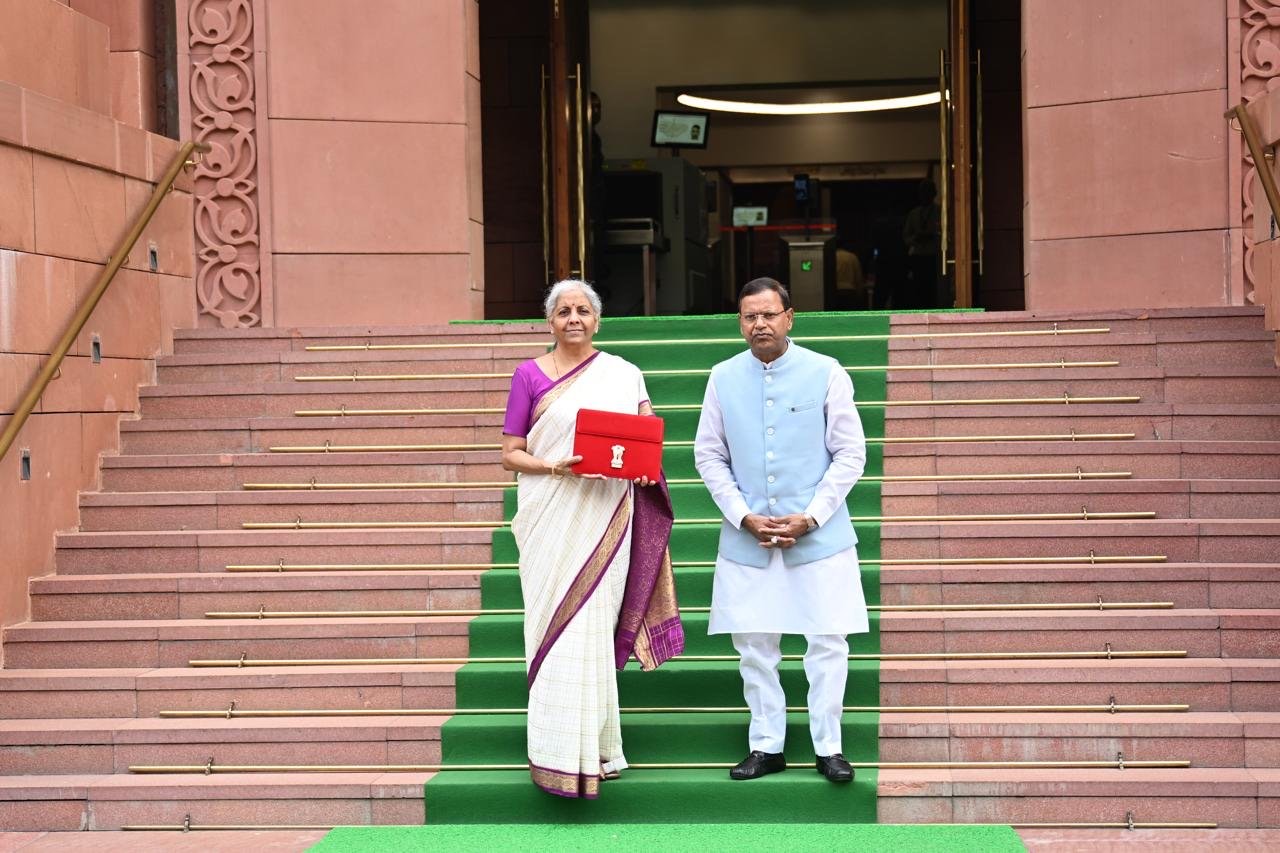
Budget Reactions: 'Rationalisation of TDS will ensure additional income in the hands of individuals'
1) Parimal Head, Chief Investment Officer, Go Digit General Insurance
The Union Budget 2024 has maintained its commitment to fiscal prudence yet announced various tax-friendly measures for the Indian taxpayers. From the perspective of the Insurance Sector, amendment made by the government to clarify various activities in insurance sector as neither a supply of goods nor a supply of services is an extremely positive measure for the sector. This will immensely reduce compliance and ongoing litigation burden and provide overall stability to the sector.
Rationalisation of tax deducted at source (TDS) from 5% to 2% for payment of insurance commission to individual agents will ensure additional income in the hands of such individuals for payments made by the insurers. TDS reduction to 2% for payment of bonus or proceeds made on life insurance policies upon maturity will also ensure higher receivables for individual policyholders.
Abolishment of angel tax for all classes of investors will provide a huge fillip to the start-up sector that in the past had witnessed funding winter. This will bring in the much-needed capital, especially from the foreign investors to the growing start-up ecosystem of the country and aid in their future growth.
Floods are one of the most common natural disasters in India. Identifying key states, the government has taken strong steps towards flood mitigation. As systemic risks of floods get mitigated over time through various measures like flood-controlled structures, it will aid insurance companies in underwriting the risks related to liability and property insurance better going forward.
New assessment model for MSME credit and announcement of credit guarantee scheme will also foster better insurance collaboration with lending companies and aid in better assessment of risks.
From an ancillary benefits point of view, the government's proposal to boost domestic tourism and unlock economic potential of key destinations will have an ancillary impact on travel insurance as well and boost its uptake as bite-sized travel insurance products will likely become part of travellers’ planning.
The government's aim to prioritise agriculture research and developing climate-resilient varieties of 32 field and horticulture crops will also have an ancillary effect on the crop insurance segment as losses over medium- to long-term will likely reduce from loss of crop due to climate-related incidents.
The Finance Minister's financial sector vision and strategy document will also be another keenly watched policy by the BFSI sector to garner better insights on the agenda planned by the government for the remaining decade.
2) Varun satia, Founder & CEO, Kraftshala
The Union Budget’s allocation of Rs 1.48 lakh crore for education, employment, and skilling is commendable. Financial support for higher education loans up to Rs 10 lakh is a positive step, but ensuring accessibility for all deserving candidates is crucial. The plan to skill 20 lakh youth over five years and upgrade 1,000 industrial training institutes is significant, but success hinges on effective implementation and quality training. The revised Model Skilling Loan Scheme is another positive move but must ensure targeted delivery.
A comprehensive internship scheme for one crore youth in top companies promises valuable industry exposure. However, educational institutions must focus on real-world skills to reduce the training burden on companies and make new hires productive faster. Employment-linked skilling schemes and direct benefit transfers for first-time employees are promising. The budget incentivizes formal employment by providing one month's wage upon workforce entry and up to Rs 15,000 in three instalments, though the Rs 1 lakh per month salary eligibility limit might need revisiting.
While the budget makes strides in education and skilling, greater emphasis on tech infrastructure and digital skills is needed. Investing in AI hubs and refining EdTech regulatory frameworks will drive growth and position India as a global leader in innovation and education. Overall, the Union Budget lays a strong foundation for improving education and employability, but a balanced focus on skill development and supporting infrastructure is crucial for long-term success.
3) Vivek Lohia, Managing Director, Jupiter Wagons Limited
On the Overall Infrastructure Sector
"The Union Budget's comprehensive focus on infrastructure development is a transformative step for our nation's future. The substantial capital expenditure allocation, along with provisions for long-term interest-free loans to states, showcases a visionary approach that will drive economic growth and innovation. Encouraging private sector participation through viability gap funding and market-based financing frameworks will foster a dynamic environment for infrastructure advancements. These initiatives are poised to significantly improve connectivity, boost productivity, and create numerous job opportunities across various sectors. By prioritizing sustainable development and leveraging both public and private investments, this budget positions India on a robust path to becoming a global leader in infrastructure excellence.”
On the MSME Sector
"The Union Budget's focus on strengthening the MSME sector is a crucial move towards fostering inclusive economic growth. The introduction of the new credit guarantee scheme and the enhanced credit support mechanisms reflect a deep understanding of the needs of small and medium enterprises. By increasing the Mudra loan limits and promoting digital credit assessments, the government is ensuring that MSMEs have the necessary financial support to innovate and expand. These comprehensive measures will not only boost the resilience and productivity of the MSME sector but also generate employment and drive economic development across the nation. We commend the government for its commitment to creating a supportive ecosystem for MSMEs, which are the backbone of our economy."
On Public Private Partnership
"Finance Minister Nirmala Sitharaman’s emphasis on public-private partnerships is a transformative step for the infrastructure sector. The simplification of FDI norms to facilitate inflows is a genuine effort by the government to attract and sustain private investment in India. By prioritizing and promoting Foreign Direct Investment, the government is creating a conducive environment for investors. By fostering collaboration between the government and private players, we can leverage the strengths of both sectors to enhance project execution, innovation, and efficiency. This approach not only promises accelerated development but also ensures that the infrastructural growth is sustainable and inclusive. The significant budget allocation towards infrastructure underlines the government’s commitment to building a robust foundation for India’s future, and we at Jupiter Wagons Ltd. are enthusiastic about contributing to this national endeavor."
4) Bhaskar Majumdar, Managing Partner, Unicorn India Ventures
This is recognition of the growing need for a deeptech economy. However, alongside the R&D Fund, the government should look at the Intellectual Property regime. The much overdue Patent Policy needs to come out soonest to enable maximisation of R&D Fund.
5) Anil Joshi, Managing Partner, Unicorn India Ventures
The Rs 1000 Cr fund of funds for space tech is testimonial to India’s capability in coming up with breakthrough solutions at low cost. This will certainly help space tech companies to look for much needed early stage capital to get started. This will certainly help mobilise over Rs 4000 Cr, great move. Angel Tax abolishment was long pending, glad that Hon. FM has heard industry voices and has finally abolished it. This will certainly help in expansion of angel investment in India and will take away a lot of burden from the minds of everyone on tax notice for tax paid investment. This will also free up a lot of domestic capital and improve the funding sentiment in a strong way.
6) Mayuresh Raut, Managing Partner, Seafund
This was an albatross that hindered much needed capital to be deployed to deserving founders. Removal of this dreaded tax will give a huge fillip to startups in the country and free up investors to focus on the investments without having anxiety on how to deal with their implications. A few other things that work well for deep tech focused funds like us. The rooftop solar policy, the pumped storage policy and research and development for small & modular nuclear reactors, Bharat small reactors, R&D for small modular reactors, R&D for new technology in nuclear form a neat troika to alter the energy map of India. Especially on the nuclear side, it positions India to replicate the renaissance that nuclear is experiencing in the US.
7) Manoj Agarwal, Managing Partner, Seafund
As a deep tech focused VC fund, FM announcing Rs 1000 crore space economy VC fund and R&D fund of Rs 1 lakh crore will work as a strong catalyst for startups in deeptech and space tech. This Budget has given attention to several demands of the industry which have been long standing. Rationalising of LTCG to 12.5% for all financial and non financial assets is also a step to bring parity between listed and unlisted companies. However, the biggest take away from the Budget is removal of angel tax. This will lead to ease in raising funding for early stage founders and will encourage more early stage investors and angels to look at startup investing as a fruitful asset class. In our view, this single announcement is a small step in the direction of making angel investment accessible for people with investment corpus which currently goes to markets and Mutual funds.
8) Mayuresh Raut, Managing Partner, Seafund*
This was an albatross that hindered much needed capital to be deployed to deserving founders. Removal of this dreaded tax will give a huge fillip to startups in the country and free up investors to focus on the investments without having anxiety on how to deal with their implications. A few other things that work well for deep tech focused funds like us. The rooftop solar policy, the pumped storage policy and research and development for small & modular nuclear reactors, Bharat small reactors, R&D for small modular reactors, R&D for new technology in nuclear form a neat troika to alter the energy map of India. Specially on the nuclear side, it positions India to replicate the renaissance that nuclear is experiencing in the US.
9) Manoj Agarwal, Managing Partner, Seafund*
As a deep tech focused VC fund, FM announcing Rs 1000 crore space economy VC fund and R&D fund of Rs 1 lakh crore will work as a strong catalyst for startups in deeptech and space tech. This Budget has given attention to several demands of the industry which have been long standing. Rationalising of LTCG to 12.5% for all financial and non financial assets is also a step to bring parity between listed and unlisted companies. However, the biggest take away from the Budget is removal of angel tax. This will lead to ease in raising funding for early stage founders and will encourage more early stage investors and angels to look at startup investing as a fruitful asset class. In our view, this single announcement is a small step in the direction of making angel investment accessible for people with investment corpus which currently goes to markets and Mutual funds
Popular Categories
Read More Articles
Travel and Tourism
Travel to Thailand gets costlier: International passenger service fee to jump 53% from June by Awadh 360° Desk February 22, 2026Travel and Tourism
Thailand Extends Visa-Free Stay for Indians to 60 Days, Allows 30-Day Extension by Awadh 360° Desk February 19, 2026Travel and Tourism
Lucknow or Zaike: A City Remembered Through Taste by Mohammed Syed Zaid February 11, 2026Business
What's Up With WhatsApp? by Prateek Shukla February 9, 2026



